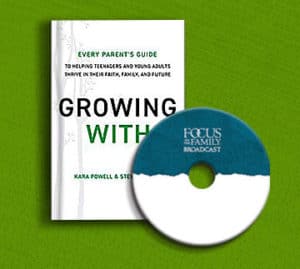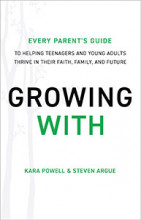Opening:
Excerpt:
Dr. Kara Powell: Ultimately, what’s more important than where their degree is from, or you know, their GPA or, you know, their financial stability, so to speak is, do they love Jesus?
End of Excerpt
John Fuller: Well, it felt just like yesterday when your kids were learning how to take their very first steps. But now they’re becoming adults. And it’s a whole different ballgame. Dr. Kara Powell is our guest today on Focus on the Family. And she’s going to encourage you with practical advice to help your – practical advice to help your son or daughter launch well into adulthood. Your host is Focus president and author Jim Daly. And I’m John Fuller.
Jim Daly: Well, John, may it be so. May we launch well, right (laughter)?
John: Indeed. Yes.
Jim: Transitions are part of that parenting journey. And we’re certainly in it now. I think you and Dena are there, too. And, as moms and dads, we play a vital role in helping our children connect with God and influence them to hopefully make good decisions. Dr. Kara Powell is a mom of three children, all of whom are in the teen years…
Kara: Yep.
Jim: …And about to launch. And so we’re all feeling the same opportunity, not pain.
John: Mmm hmm.
Jim: I was going to say pain. But it’s an opportunity.
John: That’s a good way to frame that.
Jim: Yeah. And I’m looking forward to what she has to share with us. She has a great book out, Growing With. And that will be the basis of our conversation.
John: As well as the research that went into the book, there’s a lot of research that Dr. Powell does. She’s the Executive Director of the Fuller Youth Institute and a faculty member at Fuller Theological Seminary. And she and her husband Dave live in Southern California. Welcome back.
Kara: Thank you. It’s wonderful to be here with you both.
Body:
Jim: OK. Let’s get right to it. So, many moms and dads – they’re concerned today, because they feel this widening gap between them and their teenagers. And you know, culture’s pulling at them, and their friend groups, and all kinds of things. In your “growing-with” approach to parenting, what are you trying to help parents do (laughter)?
Kara: Well, I think you said it well, Jim, that we, as parents of teenagers and young adults – we live with a few fears, that as our kids grow up they’re gonna grow apart from us. And they’re gonna grow apart from God and the church. And so, that’s why, I along with my colleague and good friend at Fuller Seminary, Steve Argue – we wanted to suggest a different, more hopeful posture of parenting, which is – we don’t have to grow apart. We don’t have to grow separate. We can grow with our kids. And the way that we define “growing with” is a mutual journey of intentional growth for both ourselves and our kids that trusts God to transform us all.
Jim: Yeah. I mean that sounds like a great goal. Now, the hard part is, how do we do that (laughter)?
Kara: Oh, and every day, I am navigating that and trying to figure that out. And it’s three steps forward and two-point-nine-three steps back in my own family. So…
Jim: Well, we did a little bit of research in the book, of course. We read the book – the idea that Krista, your daughter, had a little example for us here, which was a class she wanted to take, a language class. You thought, living in Southern California, she should take Spanish. I would have agreed with that.
John: Sounds smart to me.
Jim: But she wanted to do something differently. What was it?
Kara: Yeah. She wanted to take ASL, sign language, and she did a little experimenting with sign language in middle school, loved it, was actually pretty gifted at it. But Dave and I wanted her to take Spanish. We just assumed she would take Spanish.
So we thought it had more service possibilities. We thought it would be more attractive for college. We thought you’d have more employment possibilities now in the future.
Jim: You had a plan for her life.
Kara: Yeah, we did.
(LAUGHTER)
Kara: It was a wonderful and good plan for her life.
Jim: And what happened?
Kara: Well, we said, “Krista, we think you should take Spanish.” And she said, “I really want to take sign language.” And in the spirit of giving her a little bit more sense of agency, a little bit more sense of “adulting” – adulting as a verb. We’ve seen the hashtag these days in our culture, you know, #adulting. Even if she was in eighth grade, we wanted to give her a sense that she had more agency. And so, we said, “Well, Krista, we think you should take Spanish. But we are open to you making the case for taking sign language.” And so, this is a pretty strong-willed girl. So, she worked with her sign language teacher to make a PowerPoint presentation…
John: (Laughter).
Kara: …On…
Jim: She was motivated.
Kara: She was motivated on why sign language was a good opportunity for her. And along with the actual slides, she did sign language of all the reasons that – that sign language was a better option. She called not one, but two colleges that she was interested in exploring…
Jim: (Laughter).
Kara: …To see if it would count.
Jim: Signed, sealed and delivered.
Kara: Exactly.
(LAUGHTER)
Kara: Literally, signed, sealed and delivered.
Jim: Well…
Kara: And so, you know, Dave and I thought, “She’s done her homework. She’s never worked so hard to try to convince us of something. And she made her points.” So, in the spirit of granting her agency and “growing with” her, we let her take sign language. And literally, just two nights ago, she was talking about being certified in sign language and how important that was to her and how much she’s loving it.
Jim: Can I just ask the two of you a question. Is this what it’s like having girls?
(LAUGHTER)
Jim: Because, I’ve only had two boys – it’s not about, “Would you like to do Spanish or sign language?” It’s about, “Have you finished your homework?” I mean, come on.
Kara: Well, we have some of that, too, with her…
Jim: (Laughter).
Kara: …Our daughters.
Jim: Boy, did we miss it (laughter).
John: There’s a whole lot you missed without girls. It’s not too late, though.
Jim: There you go.
Kara: Yeah. Yeah.
Jim: Let’s look at some of the content in the book. You give parents three strategies for helping their children have better connections with God, family members, and also with the world around them…
Kara: Yeah.
Jim: …Which – that’s a great goal. We’ll cover each of those over the next little while. The “withing” and the “faithing” and “adulting” that you just mentioned – I guess “adulting,” for those of us that don’t know what that means – “it’s to do adult stuff.”
Kara: Yeah. Yeah.
Jim: What does “adulting” mean?
Kara: To mature – and I’ve already used the term “agency,” which is a term that psychologists love to use, which is basically an individual sense that they have control and autonomy and can influence the world around them. You know, so often, young people don’t feel like they have that sense of influence in the world around them. And part of what we want families and churches to do is hand the reigns, hand the keys over to young people more. And let young people take sign language, in the case of my eighth-grader, heading into ninth-grade, several years ago. And so, part of what we explore in our book is how church and service gives wonderful opportunities for young people to adult. So, many of the young people we’ve interviewed in the last handful of years talk about how their involvement in ministry really helped them understand their passions, their God-given skills. It was volunteering in third-grade Sunday school that led them to understand that they were interested in teaching. It was helping out in the church’s coffeehouse.
Jim: So exposure.
Kara: Exactly.
Jim: Yeah.
Kara: And all of a sudden, they realize, “I’m good at this. I’m – I’m interested in this.” They were being mentored by others in their church. So, you know, we’re constantly telling parents of teenagers and young adults who it maybe feels like they’re drifting a little bit vocationally and maybe taking a while to adult, boy, if you can help your young person find a way to serve and start exploring and using some of those gift muscles, even without receiving a salary, but getting some great experience, some great mentoring – we have countless examples of how God used that.
Jim: Let’s describe the “withing” strategy. What does it mean? What is “withing”? And then how does that express itself?
Kara: Yeah. Yeah. So if “adulting” is a young person’s interaction with the world and their future, “withing” is a young person’s interaction with the family and how in the midst of a young person growing from dependence to independence, what we ultimately want for that young person in our family relationships is interdependence. And so, as they’re maybe pushing away from us a little bit, how do we maintain a sense of constancy and unconditional love, so that when they’re ready to come back, they know that they can come back to us? And that’s hard as a parent of a teenager or young adult, because sometimes when our kids kick away from us – and I talk about this in the book. Sometimes when our kids and when my kids have – have moved away from me in developmentally appropriate ways, in ways they should be, at age 15 or age 20 – sometimes when my kids have pushed away from me, that can leave me feeling bruised and insecure…
Jim: Yeah.
Kara: …Even angry…
Jim: Yeah.
Jim: …Uh, and leave me feeling like they’re not being grateful, whatever it might be. And so, sometimes I react because it triggers my issues. And I might move away from them. And honestly, that’s one of the worst things we can do as a parent.
Kara: Yeah.
Kara: So, you know, what we talk about with “withing” is, how do we maintain that sense of constant unconditional love so that when our kids are ready to swim back to us we’re that stable wall?
Jim: And you had a great example of that with someone named Nora in the book, where she found a way to connect with her son. But it was kind of unexpected. And she had to go out of her normal routine to do it.
Kara: Yeah.
Jim: It wasn’t something she wanted to do. Explain what happened.
Kara: Absolutely. We hear from parents all the time that they want to spend time with their kids, but their kids don’t want to spend time with them.
Jim: Are you serious?
Kara: Yeah.
Jim: I’ve never heard that. I’m kidding.
(LAUGHTER)
Kara: Yes. Yes. Everyone’s in a while, Jim…
Jim: Yes.
Kara: ….Believe it or not, it happens. And so, you know, we, as parents – we end up kind of feeling like we’re chasing after our kids a little bit. And Nora was this one parent who had a 17-year-old son. And she said, you know, I ask my son, “Do you want to go out to eat?” And he says, “No.” I said, “Do you want to go out to shop?” And he says, “No” even more strongly. But she said I have figured out what my son loves. He loves movies. And so she said, “I have become a student of movies.”
Jim: Yeah.
Kara: And that is what my son will do with me. I will go to him and I’ll say, you know, do you want to see such and such a movie? And that is when he says, “yes,” when I ask him if he wants to spend time. And this is why his mom – because her best conversations are in the car, usually after the movie. This is why his mom – she chooses movie theaters that are geographically further away than need be…
Jim: Oh, right.
Kara: …Just to get that extra, like…
Jim: Oh, wow.
Kara: …Ten minutes in the car with her boy, with her 17-year-old, because…
Jim: It’s better.
Kara: …Those are some of the best conversations she has. Now, she doesn’t like to study directors and film genres and actors. And I mean that’s not what she wants to do. She doesn’t like that, per se. But she’s crazy about her son. And so that’s how she’s withing. That’s how she’s “growing with” her learner in this high school season.
Jim: Well, and a controversial one, I know for us – you know, our boys on the weekend. They’ll play some games.
Kara: Yeah.
Jim: …On the gaming monitors and all that. Up until recently, I really haven’t engaged much with that, because I’m doing my own thing.
Kara: Sure.
Jim: I just last night – for the first time, I really got into it with them. I was pathetic at it.
Kara: Yeah.
John: They always whip us (unintelligible)…
Jim: They were howling, they loved it so much.
Kara: Well, and I think, Jim, that’s a wonderful example, because even the fact that they’re better than you…
Jim: A lot better.
Kara: A lot better.
(LAUGHTER)
Jim: I mean, I’m really bad.
Kara: Like, exponentially better with you than that – but even that dynamic is a wonderful dynamic.
Jim: Yeah.
Kara: And parents find that a lot. When you lean into your kid’s expertise and your kids kind of the master at something…
Jim: Oh, yeah.
Kara: …And teaching you, that’s a wonderful flip. And – and then that makes them more receptive when you end up back in the teacher role…
Jim: Oh, yeah.
Kara: …Because they’ve been in the teacher role with you.
Jim: It’s fun.
Kara: So I love that you did last night.
Jim: Well, this morning – I mean, it’s funny because Trent – the first thing he said to me this morning was, “That was so fun watching you fail.”
(LAUGHTER)
Kara: Yeah.
Jim: So that’s good, I guess.
John: Yeah.
Jim: You enjoyed it. I didn’t.
John: We’ve had it – I’ve had it so bad that my son tries to let me win. I can tell. It’s sort of like, we’re not even halfway through, like, a football game, and he’ll be running the wrong direction.
Kara: Yeah. Yeah.
John: He’ll be throwing bad passes.
Kara: Exactly (laughter).
Jim: That’s exactly right.
John: It’s like, “You can do it, Dad. Come on.” Well, we’re talking to Kara Powell on Focus on the Family today. And, she’s got this great book, Growing With. And the subtitle is Every Parent’s Guide to Helping Teenagers and Young Adults Thrive in Their Faith, Family and Future. We have it here at Focus on the Family and, of course, a download or CD of the conversation. And, you can call us for details – 800, the letter A and the word family or stop by focusonthefamily.com/broadcast
Jim: Kara, I know some parents listening right now, they’re struggling to do life with their kids. Maybe we just laughed about what we said, but they’re going, “Uh-oh. I haven’t done that.” You’ve done a lot of research that has highlighted points of conflict that parents have with their children today and what they’re facing. How should parents be involved in helping their child work through some of these things? And maybe you can point us to the research. What have you found?
Kara: Sure. First off, let me just encourage parents that it’s never too early, and it’s never too late to put into practice what we’re talking about. I mean, my youngest – our youngest – Dave’s and my youngest – was about six, when we first started doing some of this research, years ago with previous books. And it changed the way that we started parenting her. And then every week, we run into families who have 20-something kids who are living out this research, and it’s making a difference. So it’s never too early or too late. The other thing I would say is, out of our research, one of the most powerful phrases that I’ve integrated into my own parenting is two words, and it’s, “I’m sorry.”
Jim: Mmm hmm – good.
Kara: And as we have interviewed parents time and time again, and especially parents who we call exemplars – parents who have amazing relationships with their kids – they talk about how quick they are to apologize to their kids. I remember one dad of three daughters, one teenager and college student and a just recent graduate. And we were set to interview him, and I was the one doing the interview. And so, I called him at the designated time, and I said, you know, “Sir, is now a good time to talk?” And he had been nominated by his church as an amazing parent, an amazing family. And he said, “Boy, I don’t really think you should be talking to me, because in the last 48 hours I’ve had to apologize to each of my girls…”
Jim: Hmm.
Kara: “…For how I’ve interacted with them.” And I said, “Well, actually that’s exactly why we want to talk to you,” because by then, in our in our research, we had seen this as a thing. So, I would say a week doesn’t go by that I’m not apologizing to my kids. And if you were to – if you were to look at what I usually apologize to my kids about, it’s usually my tone of voice, or my attitude. If you were to read a transcript of what I say at home, the words are OK. It’s the affect with which I communicate those words that I usually end up regretting.
John: What is that for parents who might be getting into the teen years or the young adult years? What tone really doesn’t work?
Kara: Oh, um…
Jim: (Laughter) “Stop that.”
Kara: (Laughter) Yeah. I would say – boy, that’s a great question, John. Nobody’s asked me that ever. The – the tone that I want to change is where – honestly, it’s a mixture of exhaustion and frustration and not liking my kid at the moment. And I’m afraid that that’s what they hear. Even if I’m not feeling that, that’s what it sounds like to them. And so, I want to – I don’t want them to hear that. And so, that’s what I’m trying to work on.
John: Well, I feel what you’re saying. And I think for me it’s kind of interesting. I can be all nice on the radio (laughter)…
Kara: Yeah.
John: …and here at work. And then I go home, and the sarcasm comes out…
Kara: Yeah.
John: …Or the instruction like they were a little 3-year-old. And boy, they shut down when I’m, you know, instructive, or angry, or sarcastic with them.
Kara: Yeah. Our families definitely see us at our worst. You know, we give – we give our best sadly often to those in other places. And at home, we let down. And, you know, we’ve told our kids, we want our home to be a safe place to let down a little bit. But we don’t want any of us in the Powell family to let down so much that we aren’t treating each other with respect and dignity.
Jim: Well, let’s dig for an example, like Krista’s vacation with you once….
Kara: Oh, yes…
Jim: …Your daughter.
Kara: Yes, yes.
(LAUGHTER)
Jim: So, what happened?
Kara: This is another story.
John: That was quick, Jim.
Kara: Oh, way to go, Jim. This is another story in the book. So, yeah. Absolutely. So I talk about this when we talk about “withing” and as part of “growing” with our kids. So we were on extended family vacation, and I had bronchitis. And so I was supposed to stay away from the family for the first couple of days, so I really did that. I didn’t want other people to get sick. But finally, you know, I had been on antibiotics. I was no longer contagious. I felt good enough. And so I wanted all five of us Powells to ride in the car together to the beach. And two of the three kids – our three kids grab their backpacks and their towels and hopped in the backseat of our rental car. But Krista, our middle child – and she’s giving me permission to tell this story. She just stood there with her arms crossed, her hazel eyes looking at me coolly and said, “No. I’d rather ride with my cousins and, you know, my aunt and uncle.” And at that time, that really hurt my feelings and made me angry. And then, I do the math on how much the vacation was costing us, and that made…
Jim: It got worse (laughter).
Kara: It made me all the more frustrated.
John: Why?
Kara: Because I was thinking, “This is our time to bond as a family. I want this time with my child, and she wants to ride with other family members.” And I’m glad she’s close to them. But I wanted this, you know, allegedly special time with her. And so I looked at my husband, Dave, and he just kind of gave a resigned nod. And so I said. “OK. Krista, you can ride in the car with my brother and his wife.” And so she did. And as we were driving to the beach, I was kind of inside seething a little bit. And I really feel like the Holy Spirit brought to mind some research that I had read that I have said to myself – gosh – so many times as a parent. It’s the work of Lisa Damour. And she writes about – she writes this about adolescent girls. But it’s just as true for adolescent boys – where she says, “What they need from adults is they need adults to be a wall.” That’s the phrase. “Be a wall.” Be a wall that won’t move. And I grew up swimming. So, I think about it as, like, a swimming pool wall. And your teenager, your young adult as they’re individuating, they’re going to kick against you. They’re going to move away from you. And sometimes you, as a parent – you feel a little dented, a little bruised, a little cracked. And, you know, everything in me when Krista wanted to not ride in the car – you know, I wanted to say, “OK, fine. I’m gonna be nicer to your cousins then.” Or…
Jim: Right. “They get ice cream…”
Kara: Yeah. Exactly.
Jim: “And you don’t.”
(LAUGHTER)
Kara: Or, “OK, fine. If you can’t be nice to me, then I’m going to take your cellphone.” You don’t get to be nice to your friends and, you know, kind of all these subtle and blatant retaliatory measures.
Jim: Oh, that’s normal. Oh, good. I’m glad.
Kara: Yeah, exactly. Yes, yes, yes – and, you know, communicate my displeasure and my frustration. But instead, I just I tried to pray over and over again on that drive to the beach, “Be a wall. Be a wall. Be a wall.” And for the next 48 hours, honestly, Krista kind of avoided me. If I was in the kitchen, she went a different way. She didn’t want to ride in the car. And then finally, after about 48 hours, she just ended up wanting to be around me. There was no magical, you know, beach walk. There was no, you know, wonderful game of 20 questions that broke open the failing intimacy. All of a sudden, things got back to normal. I’m so glad about is, in the midst of my frustration, my anger, my feelings of rejection, quite honestly, I didn’t do something that would have severed my relationship with Krista. I didn’t do something that would have caused Krista to not come back to me eventually. And so, you know, that’s what we want to say out of a “growing with” – is how can we, as parents, stepparents, grandparents, caring mentors – how can we be that wall so that, when young people are ready to come back to us, we are there for them, and they know it?
Jim: Yeah. I wanted to mention some of the statistical data that you found.
Kara: Yeah.
Jim: And I’ll just rattle it off. And you can comment on it.
Kara: Wonderful.
Jim: I’ve got it here. 48% of families have experienced financial conflicts with their young adult.
Kara: Yep. It’s one of the top sources of conflict, actually – the 20-somethings.
Jim: That seems reasonable. I don’t think that’s out of sorts. It didn’t seem really high or really low to me – about half.
Kara: Mmm hmm.
Jim: But it’s, “How are you paying your rent?” “Are you buying food?” “What are you spending your money on?” – right?
Kara: Yep.
Jim: That’s conflict.
Kara: Yep.
Jim: And there – maybe the conflict’s created because they’re calling home saying, “Hey, Mom. I need more cash.”
Kara: And I think it’s actually – it’s a little exacerbated because they’re often living at home.
Jim: Or living at home, right.
Kara: If you look at this kind of boomerang generation….
Jim: “Do you have some money for me tonight?”
Kara: …It’s getting married five years later, having kids five years later than previous generations. So, you know, the kind of – we laugh about that 20-something who comes back and lives in their parents’ basement. But that’s actually happening quite a bit. So I think that’s…
John: I think that’s happening next week in my home.
(LAUGHTER)
Kara: OK. So, there you go.
Jim: Let’s turn the table here.
John: Yeah, exactly.
Jim: Listen in, John. Here we go.
John: I’m listening. Here we go.
Jim: But that’s part of it. And it’s – but it seems like it’s almost a normal conflict…
Kara: Yeah, absolutely.
Jim: …That a lot of people struggle with.
Kara: But like you – I mean, you kind of hinted at this, Jim. So then the key is, as a parent, is to have good communication with your young person…
Jim: Sure.
Kara: …And to be able to set goals and to be clear. Like, A – if you come home, are you gonna be expected to pay rent? For how long do we feel OK with you living at home?
Jim: Let’s get a plan together.
Kara: Exactly.
Jim: Yeah. I like that.
Kara: …And that everybody’s clear.
Jim: Here’s another one. 39% of families have experienced occupational conflict. That one – I wasn’t quite clear if that’s, um, I want my son or daughter to grow up to be a doctor, and they love doing nails – I mean, whatever.
Kara: Yes. Right, right, right.
Jim: Is that the conflict you’re talking about?
Kara: Yeah. That’s a lot of it.
Jim: I have a dream for you.
Kara: Parents have expectations, and then their kid has a different plan.
Jim: OK. So speak to the parent who struggles with that. What do you say to them? “Chill out” (laughter)? I mean, is some of it – I can remember this. I mean, this is a little – John, this will help make you feel better because I remember saying to Trent – he was struggling, you know, doing homework and getting grades in on time. And he was probably a ninth-grader. I said, “Man, you’re gonna be a ditch digger.” And I was in this thing for, like, three days…
Kara: Yeah.
Jim: …Saying this.
Kara: Yeah.
Jim: I feel horrible about it now.
Kara: Yeah.
Jim: How effective was this?
Kara: Yeah.
(LAUGHTER)
Jim: Well, this is how effective it was. So, after the 15th time I had said this, he looked at me and said, “Dad, as long as I love Jesus, what’s – what’s wrong with digging ditches?”
Kara: Nice.
Jim: (Laughter) OK.
Kara: Nice.
Jim: Yeah.
Kara: That was his drop-the-mic moment right there.
Jim: Boom.
Kara: Yeah, totally.
Jim: That was the drop the microphone. Yeah. And I was like, “OK.”
Kara: He should be hosting this radio show, Jim.
John: (Laughter).
Jim: Right. You’re right. I’m wrong. I’m sorry.
Kara: Yeah – good.
Jim: And that’s what I said.
Kara: Yeah.
Jim: I just – “I won’t say that again.”
Kara: And you apologized.
Jim: Yes.
Kara: Good for you, Jim.
Jim: Yeah.
Kara: Yeah. And that’s…
Jim: But is that the occupational problem here?
Kara: Yeah.
Jim: OK.
Kara: That’s the occupational problem. And whether it’s college or whether it’s job, whatever it might be or, you know, military, whatever path you have in mind for your kid, one of my biggest encouragements to parents – and I’m looking in the mirror myself at this one – is – I know my own issues certainly cloud that. And I have certain desires for my kid.
Jim: Sure.
Kara: And how do I really put those aside and instead be ruthless about focusing on, what does God have for them? And as your son said, I mean, ultimately, what’s more important than where their degree is from or, you know, their GPA or, you know, their financial stability, so to speak, is, do they love Jesus? And so…
Jim: It is the core.
Kara: That is the core.
Jim: This is the white-water-rapid period…
Kara: Yeah.
Jim: …You know, that kind of – certainly 13, but that’s a bit early – but, you know, 16, 17, up through 25. And you’ve done that research, too.
Kara: Yeah.
Jim: How many – how many young people fall away from the faith, stop going to church…
Kara: Yeah.
Jim: But then how many people come back?
Kara: Yeah.
Jim: And I love the fact that you are mindful of that.
Kara: Yeah, yeah.
Jim: For that little ray of hope in that research, what do you see, and what have you learned about the 30-, 40-somethings that have fallen away in their 20s?
Kara: Yeah. Yeah. So about – the best compilation of research seems to say that about half of young people who graduate from great churches and families from high school drift from God in the church after they graduate from high school. So that – that’s bad news.
Jim: About half.
Kara: About half – somewhere between 40 and 50%. That’s the really discouraging…
Jim: Right.
Kara: …depressing news. About half of those who drift seem to come back to the church, generally when they get older, get married and have kids.
Jim: Right.
Kara: So that’s often the magnet that draws them back.
Jim: So then roughly a quarter?
Kara: About a quarter then don’t come back.
Jim: Right.
Kara: I think the dynamic that we’re still understanding, though, is that since 20-somethings are having kids later now, they’re making more and more worldview, vocational, financial, etc., choices before they have kids. So the ruts of their life are deeper. And so, I have some questions about if that half who come back is going to stay. But at least that’s what it’s been for previous cohorts. So, that is helpful for those listeners. And I know it’s many, many, many, many, many listeners…
John: Yeah.
Kara: …whose kids and grandkids have drifted from God and the church. We hear all the time about how God draws them back. So…
Jim: Absolutely. I’ll hit a couple of others right at the end here. 36% are stressed. The parents are stressed, because of substance abuse or use. That broke my heart.
Kara: Yeah, yeah.
Jim: Thirty-six percent is a high number.
Kara: Yeah.
Jim: 27% are concerned over educational progress.
Kara: Yeah.
Jim: That seems low to me, but…
Kara: Yeah.
Jim: Maybe that’s because I have boys.
(LAUGHTER)
Kara: And you have teenagers, so…
Jim: Yeah, right. And then 19% – this one seemed low. Nineteen percent of parents are distressed over their child’s romantic life.
Kara: Yeah.
Jim: Well, that just seems low to me.
Kara: Yeah. That is interesting. (Unintelligible)
Jim: Is that a checkout? Is that a parent who’s simply checking out, saying, especially at 18, 19, 20 – “Well, I did my best. Now it’s on them”? But only 19% are worried about premarital sex, or things like that. That seems low to me.
Kara: Well, you’ve got to remember this is across the board. It’s not just faith-filled parents.
Jim: OK. Well, OK.
Kara: So, other parents might have different concerns than that. So…
Jim: Yeah. Kara, the one we’re missing is “faithing.” We’ve got the “withing” and the “adulting.” So, quickly, tell us “faithing.” And then tomorrow, we’ll unpack that more.
Kara: Yeah. I’d love to unpack it more in depth tomorrow. So look forward to that. But, just really briefly, “faithing” is the way that we as parents walk alongside our kids in the midst of their evolving, stretching, growing relationship with Jesus Christ.
Jim: Yeah. That was quick. I mean, one of those experiences for me would be not to expect your 16, 18-year-old to act like a 50-year-old Christian (laughter).
Kara: Yeah. Yeah.
Jim: They’re going to make mistakes. Their judgment isn’t formed. They don’t have life experience. I can’t wait to get into that with you next time. So, let’s do that. This has been fantastic, by the way. Thank you…
Kara: Oh.
Closing:
Jim: …for bringing this to the studio and your great book, Growing With. And we’ll cover that. And let me tell you. This is well-researched. I mean, Kara Powell – Dr. Kara Powell is a researcher, at her core, at Fuller Seminary. And this is what she does. And this is packed with great input and great content. And I would say, we’ll make that book available to you for a gift of any amount, just as our way of saying thank you for supporting the ministry here and helping other parents do a great job. If you can’t afford it, get in touch with us. We’ll trust that the Lord will bring enough to cover that cost. And, this is that resource that every parent should have in their arsenal, their library to help them do a better job.
John: I would agree, Jim. So if you’ve got a 12-, 13-year-old, it’s not too early…
Jim: (Laughter) Not at all.
John: …To start reading about this. And if you’ve got a 20-something, it really is going to be a great resource for you. Contact us today. Our number is 800, the letter A and the word family – 800-232-6459. Or stop by focusonthefamily.com/broadcast. And by the way, we have a special bundle. If you can make a donation today, we’ll send a copy of the book and a CD of our two-day conversation now with Kara. We’ll send those to you, in fact, even if you can only make a one-time gift, we’re sensitive to that fact you may not quite commit to a monthly gift. Either way, make a generous donation of any amount to Focus on the Family – when you call 800, the letter A and the word family.
And on behalf of Jim Daly and the entire team, thanks for joining us today for Focus on the Family. I’m John Fuller inviting you back as we once again help you and your family thrive in Christ.
























